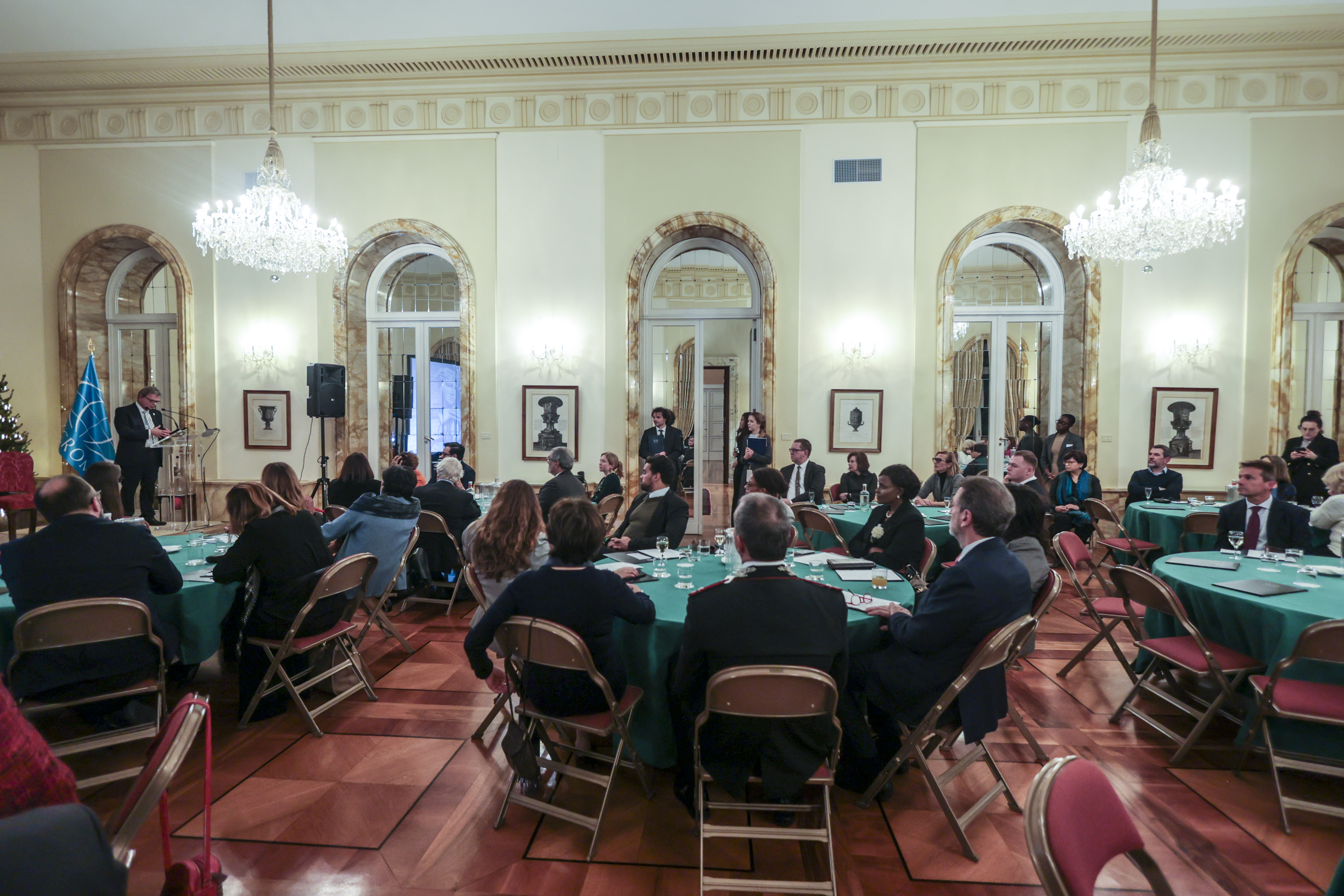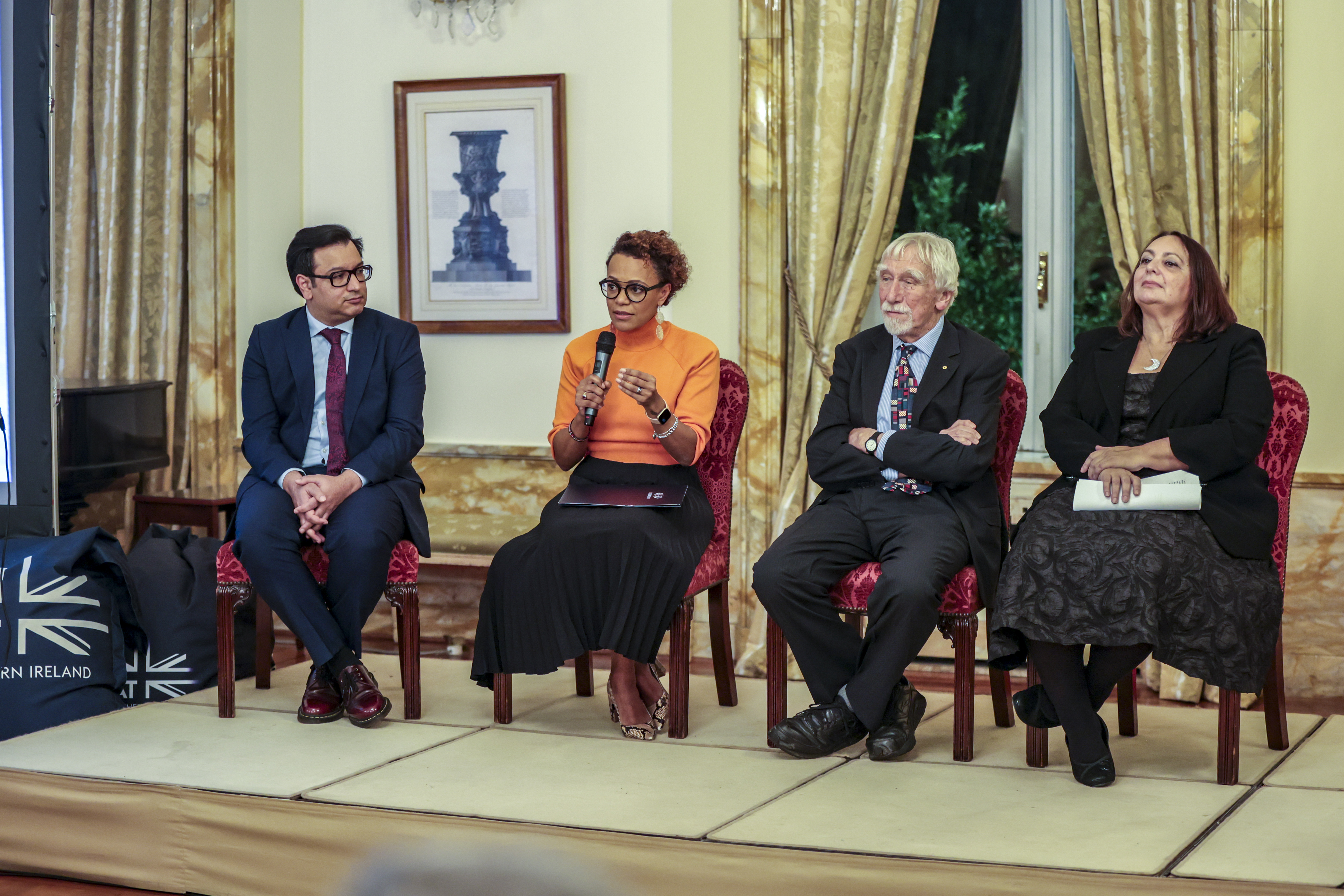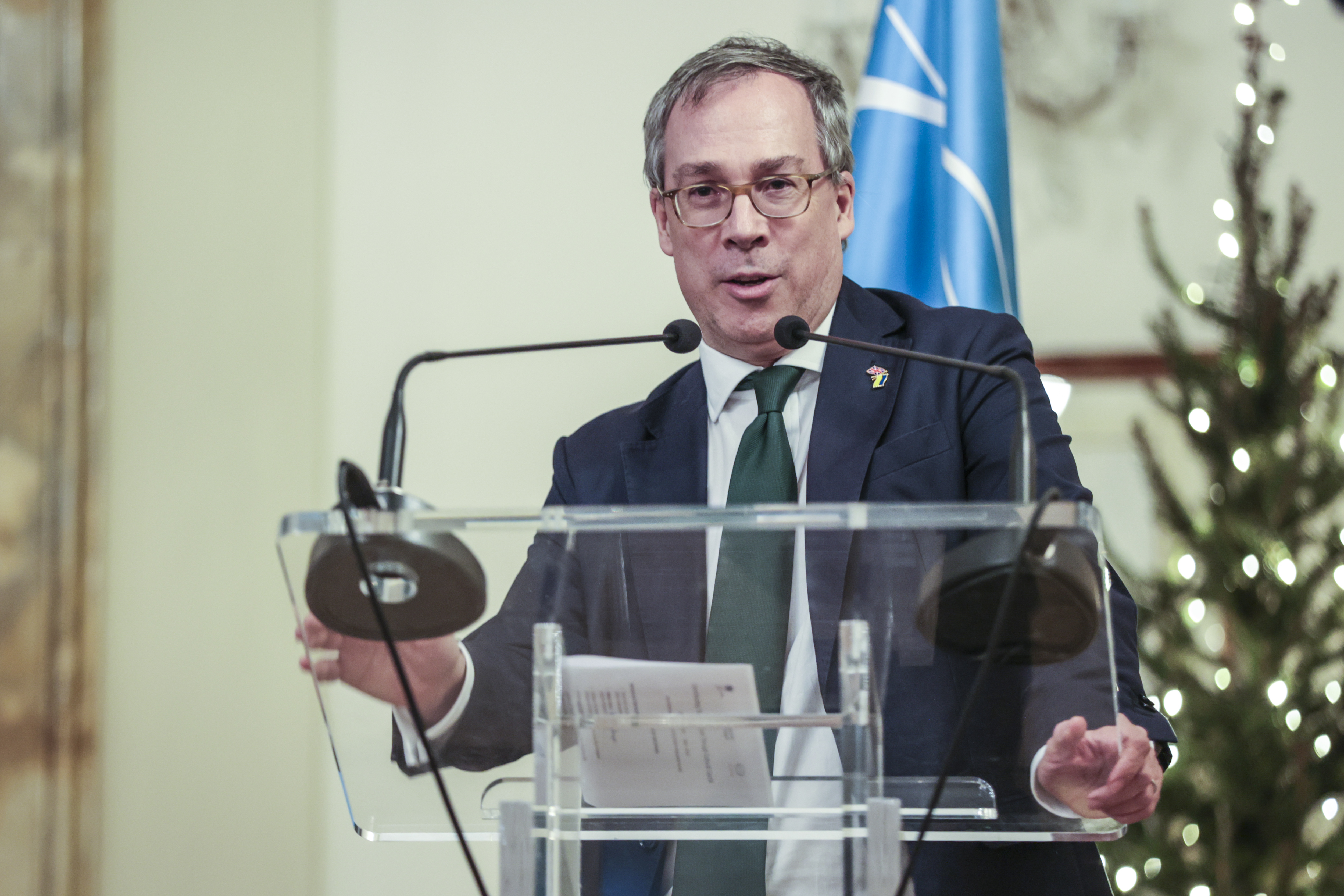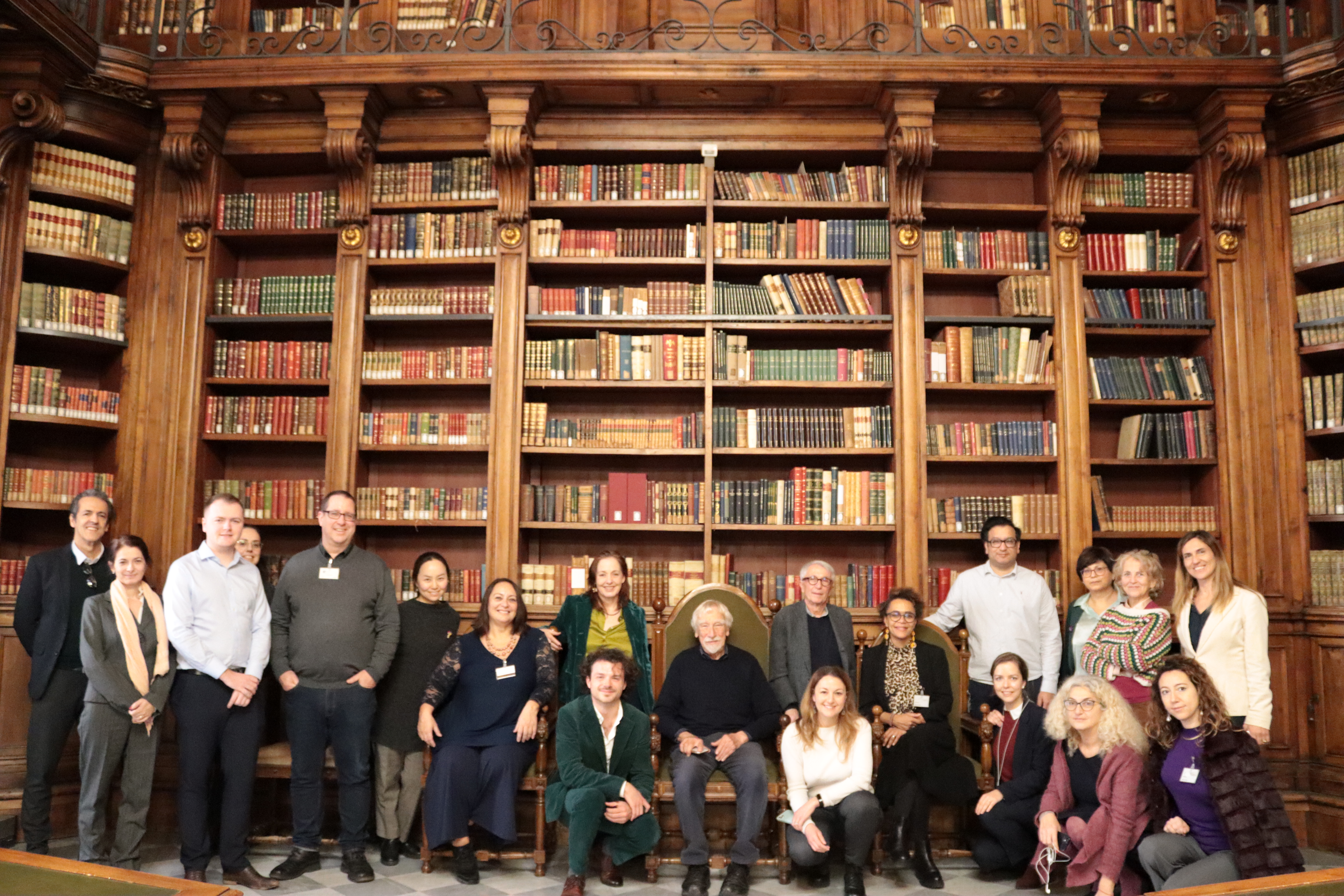The "Valuing Cultural Capital" event series, organized by ICCROM and the University of Glasgow and held at the official residence of the Ambassador of the United Kingdom to Italy and the Ministry of Culture of Italy on 5 and 6 December, respectively, brought together heritage experts and economists to brainstorm how we can measure the value of our heritage and amplify it.
These events explored the vital role culture and cultural heritage play in bettering people's lives and how we might acknowledge this contribution more holistically within policy and decision-making in order to promote well-being.
Expert panel discussion – “Contributing to Better Lives through Cultural Capital”
Organized by ICCROM and the University of Glasgow with the generous support of the Embassy of the United Kingdom to Italy, the 5 December evening reception brought together the Rome-based diplomatic community to listen to talks from distinguished speakers from the fields of cultural capital economics and well-being.
Speakers and guests were welcomed by Lizzie Lovat, Head of the Political and Bilateral Section of the British Embassy in Rome; Joseph King, Senior Director of ICCROM; Professor Sir Anton Muscatelli, Principal and Vice-Chancellor of the University of Glasgow; and Erminia Sciacchitano, Senior Advisor on Multilateral Affairs at the Ministry of Culture of Italy.
Lizzie Lovat opened the event, stating, “There is an understanding [in Italy] of how integral culture is to our societies and an intrinsic sense of its importance for our well-being. That’s why we’re so delighted to be able to host this event in Rome this evening”.
Following this, Joseph King remarked on the centrality of the event theme to ICCROM’s vision of heritage conservation, founded on promoting effective people-centred approaches. He noted, "Our partnership with the University of Glasglow and the United Kingdom plays a pivotal role in realizing this. Through our collaboration, ICCROM seeks to share and disseminate the groundbreaking work that is carried out by cutting-edge research initiatives, including those in the UK".
Professor Sir Anton Muscatelli, Principal and Vice-Chancellor of the University of Glasgow, explained the importance of the evening's topic: “As a historic University with a rich and diverse heritage, we understand the immense value of culture to our collective understanding of key issues, the communities we serve, the economy and the well-being of society as a whole. I’m pleased that colleagues from the University of Glasgow are collaborating with partners like ICCROM to share their insights and expertise in this field of research, shaping our wider understanding of the hidden value of cultural capital and the social benefits that it can bring”.
Erminia Sciacchitano wrapped up the event's first portion with encouraging remarks. “'What makes life worthwhile?’ We, working in the cultural sector, immediately answer: its culture. It’s a fundamental component of our lives, identities, sense of belonging and social relationships, and it’s a key driver to achieve sustainable development, peace and prosperity”, she stated. “The value of culture does not yet feature within traditional economic assessment, leading to a tendency to undervalue and underinvest in culture and cultural heritage. So that’s why we’re here today: to change this approach, this perception. Italy is fully committed”.
The event featured keynote speakers David Throsby, Distinguished Professor of Economics at Macquarie University, Australia, and Harmann Sagger, Head Economist for Arts, Heritage and Tourism at the Department for Culture, Media and Sport of the United Kingdom.
Their remarks were followed by a lively panel discussion, including Adala Leeson, Historic England’s Head of Socio-Economic Analysis and Evaluation, and Dr Patrizia Riganti, Professor in Tourism at the University of Glasgow’s School of Social and Environmental Sustainability.
Adala Leeson added to the conversation with her remarks about the urgency of having evidence to advocate for heritage as a public good. “Our key goal in the public sector is to provide public value – to provide public welfare, increase well-being. And that means we have to look beyond GDP. It’s important that we start to bring in other forms of capital that actually influence people’s lives and make a difference”, she explained. “We’re excited that the culture and heritage capital program is going to give us a framework from which we can talk as a sector. We can have a joint voice and give it power even on an economic platform”.
Host of the evening Ambassador Rt Hon Lord Llewellyn of the British Embassy in Rome rounded out the event by noting the timeliness of the conversation. “The link between culture and well-being – between our cultural heritage across the world and our well-being as human beings – is more acute and more keenly felt today than it has been for many years”, the Ambassador stated.
The organizers were honoured to welcome HE Jackline Yonga, Ambassador of Kenya, to the evening reception.
The event was well-attended, with representation from the Embassies of Australia, Canada, Costa Rica and Estonia – all of whom are ICCROM Member States. Also present were representatives from our valued partners, including the US Mission to the UN agencies in Rome, the Delegation of the European Union in Rome, ICOM, ICOMOS Italia, Italy’s Carabinieri Command for the Protection of Cultural Property (Comandante Carabinieri Tutela Patrimonio Culturale), Fondazione Scuola dei beni e delle attività culturali, Fondazione Santagata for the Economics of Culture, and the National Research Council. Representatives from UK institutions – the Government of the United Kingdom’s Department for Culture, Media and Sport; the British Council; Historic England and Historic Environment Scotland – also came to Rome for the event.
Many academic institutions joined the event as guests, including the Egyptian Academy in Rome, the Norwegian Institute in Rome, the American University of Rome, Instead Heritage and the Herculaneum Conservation Project, and local universities La Sapienza University and Roma Tre.
Follow-up workshop on Evidencing Heritage Value
On the following day, 6 December, ICCROM held a workshop, hosted by the Italian Ministry of Culture at their headquarters in Rome, for cultural economists and heritage practitioners. It considered the use of economic methods as tools for informing heritage policy and investment decision-making and highlighted recent research developments.
Additionally, participants explored how cultural capital valuation methods can benefit heritage practice, providing useful tools and processes for informing community-based decision-making and driving better outcomes.
The workshop’s thrust was how these principles are currently used, what knowledge gaps exist and how to bridge these and promote wider practice and valorization of cultural capital.
The two days of events were a continuation of joint efforts between ICCROM and the University of Glasgow to nurture research about valuing cultural capital. With the Valuing Cultural Capital panel and workshop, ICCROM is honoured to have been joined by the Government of the United Kingdom in our efforts to elevate this discourse, illustrating the pioneering work happening in DCMS and Historic England. We are also proud to have brought attention to important, relevant research and implementation efforts ongoing in Italy.




